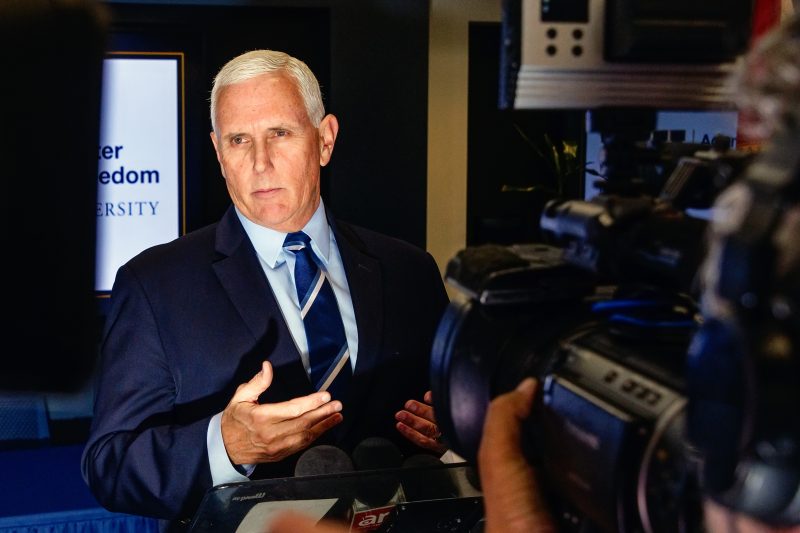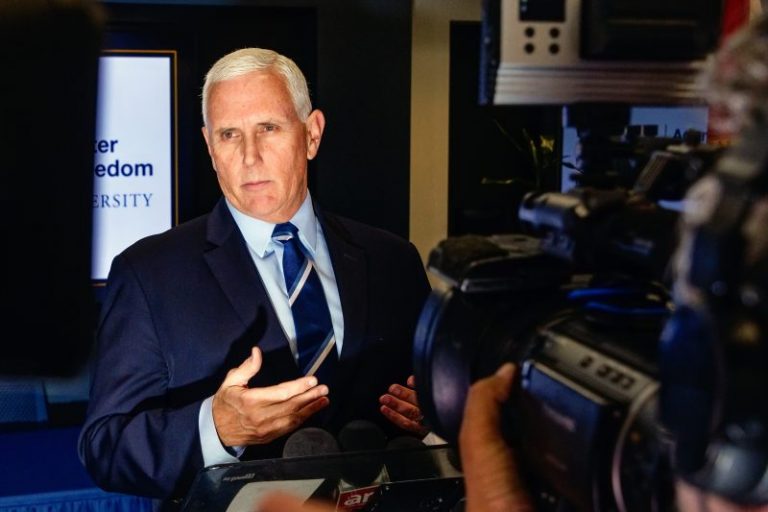
A federal judge on Friday unsealed a potentially landmark ruling that compelled former vice president Mike Pence to testify earlier this year before a grand jury investigating the Jan. 6, 2021, Capitol attack and efforts to overturn the 2020 presidential election.
Pence had initially fought the subpoena from special counsel Jack Smith. But in March, Pence hailed what he called a historic decision by Chief U.S. District Judge James E. Boasberg of Washington, agreeing that Pence could remain silent on topics that dealt specifically with his role in Congress on Jan. 6, when he presided over the Senate in a joint session to confirm results of the presidential election, which was interrupted by a violent pro-Trump mob.
Pence called Boasberg’s ruling the first to lay out how a vice president also qualifies for constitutional protection enjoyed by lawmakers from being compelled to testify even in criminal investigations.
Boasberg’s ruling and reasoning had remained secret until now because grand jury rules generally bar anyone other than witnesses from discussing them. News organizations asked the judge to unseal them, and on Friday he granted their request. Boasberg said repeated discussions and revelations by Pence and his lawyers removed the need for secrecy.
Boasberg’s 18-page opinion, issued in March, reveals that the court allowed Pence the privilege to avoid testifying only in response to very specific questions. In particular, prosecutors are believed to have wanted to ask Pence about Trump and others’ failed efforts to pressure him, the Trump Justice Department and officials in key swing states to overturn the election. That includes attempts by Trump’s lawyers to substitute allies for certified electors from some states Joe Biden won. Boasberg did not appear to rule out such questions.
“The Court holds that, while the Clause does apply to the Vice President, it does not cover the vast majority of what the Special Counsel seeks to ask him about. The Court will thus largely deny the former Vice President’s motion,” Boasberg wrote in his ruling.
The Constitution’s “speech-or-debate clause” was intended to protect elected members of Congress who are conducting the people’s legislative business from coercion or intimidation by the president’s agents — such as the threat of investigation or jailing — a core separation-of-powers principle.
But in a key finding, Boasberg said the protection is limited to lawmaker’s official duties, or actions taken in preparation for them, and does not extend to “communications urging a lawmaker to act unlawfully.”
Boasberg drew a line between Pence’s actions preparing for and delivering of floor speech on Jan. 6, as well as his internal staff advice on the scope of his authorities that day, which were protected, and conversations by Trump or others encouraging Pence to stop Congress’s confirmation of the election results, which the vice president’s own aides told him he was not legally authorized to do.
“The bottom line is that conversations exhorting Pence to reject electors on January 6th are not protected” from inquiry, Boasberg said.
Pence sought to carve out a wider range of conversations, including any meant to “educate a legislator on a matter before him,” even incidentally.
But that “would cover any conversation with anybody with an opinion … That cannot be the rule,” Boasberg wrote. “Instead the touchstone is whether these conversations were integral to the Vice President’s performance of his official duties.”
Boasberg did not unseal his entire opinion, leaving redactions removing references to any specific testimony or prosecutors’ factual or strategic basis for seeking it, as the investigation is ongoing. The Justice Department did not appeal a ruling issued earlier Friday by Boasberg in which he said he planned to unseal redacted case documents.
“The heart of what the Press asks for here, and what the Court plans to release, is the legal discussion surrounding the dispute Pence has already revealed,” Boasberg wrote in Friday’s ruling.
Pence, who is running against Trump for the 2024 Republican presidential nomination, has positioned himself as a reluctant witness who has fought demands for his testimony. Still, he discussed events in his book issued late last year, “So Help Me God,” and in promotional interviews.
Top aides Marc Short and Greg Jacob, Pence’s chief of staff and chief counsel as vice president, have spoken to the Justice Department and also appeared before the grand jury. Jacob told congressional investigators, for example, that Trump attorney John Eastman acknowledged to him that efforts to get Pence to block Biden’s electoral college victory would violate the Electoral Count Act, and that Trump was informed it would be unlawful.
Pence has said Trump’s actions endangered everyone at the Capitol, including Pence’s family members trapped with him there, but publicly downplayed Trump’s criminal culpability.
“Well, I don’t know if it is criminal to listen to bad advice from lawyers,” Pence told NBC’s “Meet the Press” last year. “The truth is, what the president was repeating is what he was hearing from that gaggle of attorneys around him.”


Comments are closed.